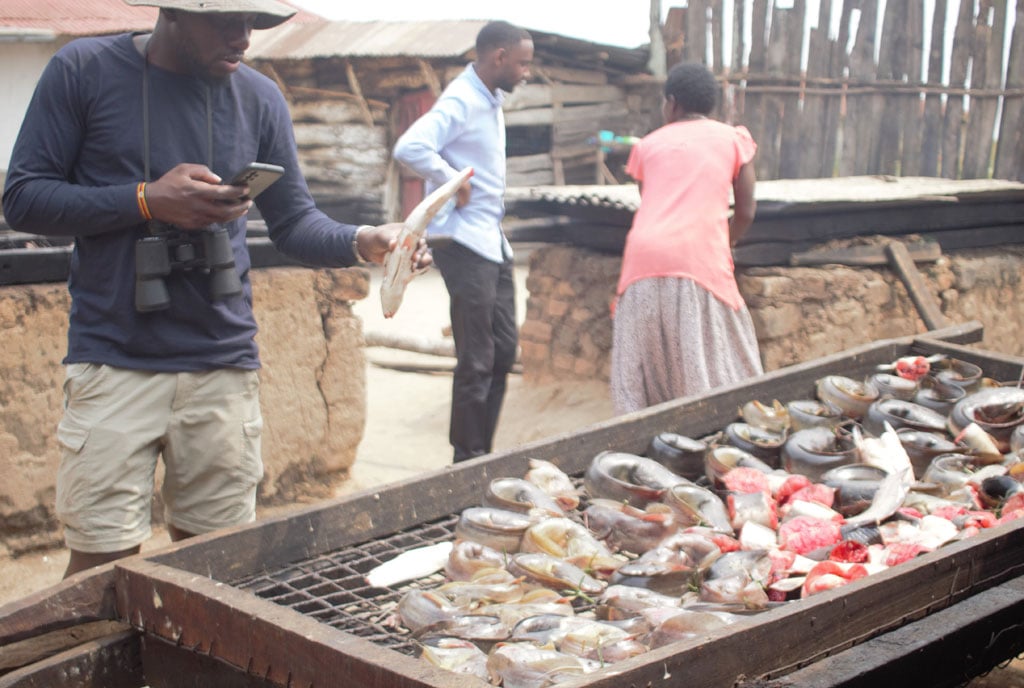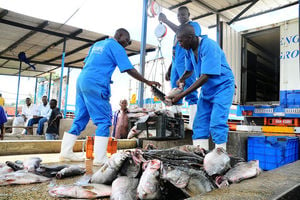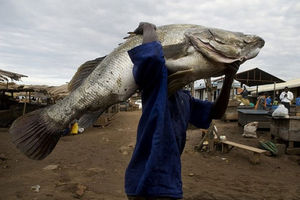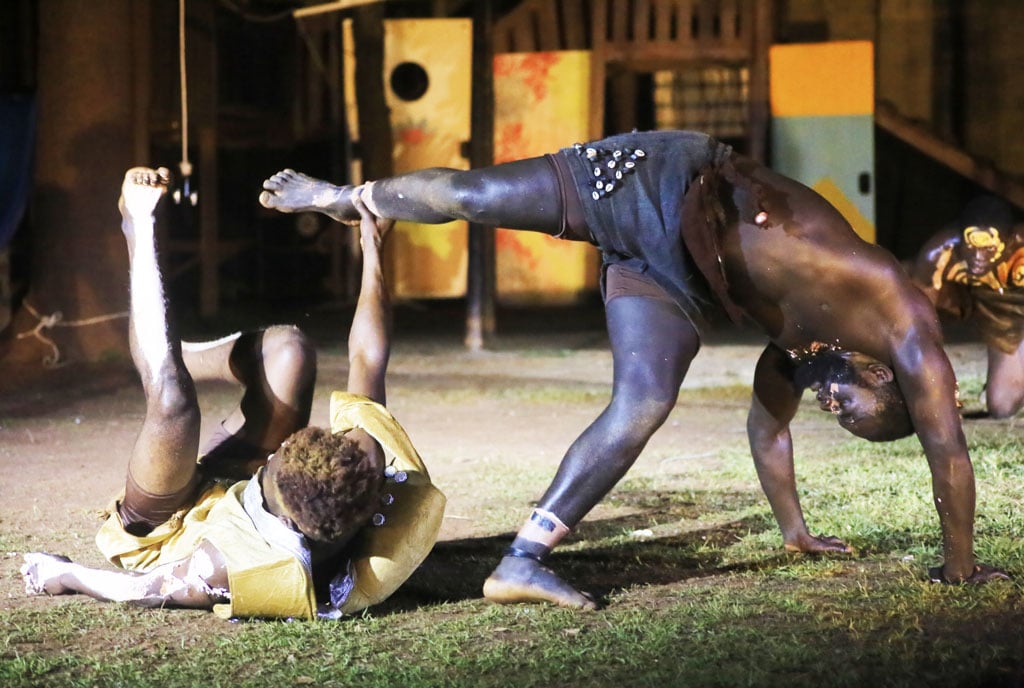
A tourist checks out the different fish species on Lake Edward. Below, fishermen ready themselves for day’s catch. PHOTO/TREVOR LUTALO
At sunset a fleet of about 50 boats sets off to Lake Edward on the fringes of Queen Elizabeth National Park in Kanungu district, clutching onto their oars with nets and hope that luck will favour them, the fishermen embark on a night’s hunt to catch fish that will be sold at dawn when they return.
At about 7am, the next day, the landing site is a swarm of activity with fishermen hauling out their boats from the water, motorcycles and trucks waiting to be loaded and traders scrambling to have a piece of the catch in separate auctions where the highest bidder earns a piece of what is on sale that day. The different species of fish will send you to complete awe.
A man presumably in his early 20s crouches over a boat engine with a spanner and other tools, this must be his workstation, as he is surrounded by a number of other engines and segments of seemingly old spare parts. A group of young adults seem to weave or repair fishing nets whilst others manually attach plastic bottles or rocks that will act as floaters or sinkers respectively, as they prepare for the next expedition.
One of them, Mr Ismail Ashaba, 24, works the nets as he tells me that the bottles used are usually reclaimed from the lake.
“It is a way of repurposing plastic and saving the environment, as the stones sink to set the net, the bottles keep it afloat,” Ashaba says.
The landing site is strewn with a number of shacks and kiosks that serve as lodging for a few shillings and convenience shops and restaurants for those looking to grab a meal or refreshments. Some of these tiny shops sell fishing gear and baits.
Legend has it that several species of fish can be found in the waters of Lake Edward locally known as Rwitanzigye or Mwitanzigye, with some believed to be extinct after going 30 years without being sighted. Some of these rare fish species are trophies that could fetch a lot of money on the global market. This critical food source provides more than 2,000 jobs to this fishing village.
“We have about seven types of fish in this lake but the major ones are four, Tilapia, Bagrus (bagrid catfish), Clarias (walking catfish), and Protopterus (lungfish). Then we also have another called Barbus, the most liked fish by the natives. Then we have Mormyrus (a fish species with a pointed snout) that dwells along the rivers in the mouth of the rivers. Also, the Labeo that has only appeared once in the last 10 years,” explains Mr Anania Mutabazi, a fisheries officer stationed on this lake.
Since 1954, when this landing site was designated, it has undergone numerous changes. The fleet has grown from just 30 fishing boats to 100, and the local natives (Banyabutumbi) have transitioned from avoiding the forests to formalising their fishing activities.
“The first fishing boats were used by the Banyabutumbi community, the natives here. These Banyabutumbi originated from Nyamishasha, somewhere in the Queen Elizabeth National Park. So, the government decided to bring them out of the forest and settle them here,” Mr Mutabazi explains.

As the government pushes for the growth of the fisheries sector, local fishers have stuck with their traditional fishing methods such as the use of fishing baskets and like any other landing site, Rwenshama has had its fair share of troubles.
For several years now, with the president’s directive, the Fisheries Protection Unit (FPU) of the Uganda Peoples Defence Forces was instituted to curb illegal fishing but the fight rages on.
“The major challenge is stubborn illegal fishers, all these people are very deadly and stubborn. When you want to arrest them, by all means he’ll make sure that he finishes you if he gets an opportunity because he knows that where you are taking him is far after all he knows that he’s breaking the law,” Mr Mutabazi explains.
Mr Mutabazi says the landing site averages Shs500m to Shs700m every month, displaying records from previous months, in June 2024 a total revenue of Shs788m was recorded and in July 2024 there was a significant drop to Shs737m .
Modest ways
As night falls, the atmosphere at the beach transforms drastically. The once bustling shoreline becomes quiet, while the nearby bars fill up with people seeking entertainment and connection. Food vendors light up their stalls with tiny lamps, creating a cozy and inviting ambiance.
The juxtaposition of a mosque next to a church outside the landing site serves as a powerful symbol of the diversity and freedom in this area.
“With only one public health centre two, one primary school and two elementary schools, this is typical of many fishing communities in the country,” says my skipper for the day, Isaac Laago.
As you travel through the dirt roads or take strolls around this fishing community, you will often spot herds of buffaloes or elephants along the way. In the shallow waters, you might catch a glimpse of several hippos or crocodiles, creating a truly breathtaking scene. This raises the question: how do the locals manage to coexist peacefully with the diverse wildlife in the area?
Quick facts
“We have about seven types of fish in this lake but the major ones are four, Tilapia, Bagrus (bagrid catfish), Clarias (walking catfish), and Protopterus (lungfish). Then we also have another called Barbus, the most liked fish by the natives.
Then we have Mormyrus (a fish species with a pointed snout) that dwells along the rivers in the mouth of the rivers. Also, the Labeo that has only appeared once in the last 10 years,” explains Mr Anania Mutabazi, a fisheries officer stationed at the lake.








